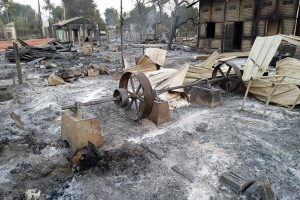On Tuesday, the United Nations published a report claiming that Myanmar’s military has engaged in “systematic and widespread human rights violations and abuses” since its coup in February 2021, many of them amounting to war crimes and crimes against humanity. The first detailed report produced by the office of the U.N. High Commissioner for Human Rights (OHCHR) since the military takeover, the 60-page indictment details how the junta had deployed “violence on a massive scale” in order to safeguard its hold on power.
In so doing, the Myanmar security forces have shown a “flagrant disregard for human life and property.” They have engaged in extrajudicial killings, using air strikes and heavy weapons on populated areas, and deliberately targeting civilians, who have been arrested arbitrarily, summarily shot, burned to death, and used as human shields. Thousands have been arrested arbitrarily and subjected to torture and other ill-treatment while in custody.
“Meaningful action by the international community is urgently needed to stop yet more individuals from being stripped of their rights, their lives, and their livelihoods,” the U.N. High Commissioner for Human Rights, Michelle Bachelet, said in a statement marking the release of the 16-page report.
“The appalling breadth and scale of violations of international law suffered by the people of Myanmar demand a firm, unified, and resolute international response.”
Based on interviews with victims of abuse and witnesses to atrocities, as well as supplementary satellite imagery, verified multimedia files, and other open-source information, the OHCHR report zeroes in on a number of grisly cases. Among them was the horrific Christmas Eve massacre in Hpruso Township, Kayah State, in which Tatmadaw personnel burned the bodies of up to 40 women, men, and children inside trucks. As the report notes, “Some of the victims’ hands had been tied and that some bodies were in positions that indicated that they were trying to escape and had been burned alive.”
The report points to the vast disruption that has been visited on Myanmar by the military’s disastrous assertion of power and privilege. The interlocking post-coup conflicts have killed at least 1,500 people displaced 440,000 people, according to OHCHR, while more than 14 million are in need of urgent humanitarian assistance. Meanwhile, the Assistance Association for Political Prisoners reports that more than 12,700 people have been detained since the coup, most for supporting (or being perceived to support) the anti-coup resistance.
The OHCHR report concludes that there are “reasonable grounds” to believe that the atrocities committed by the Tatmadaw “were carried out in the context of a widespread and systematic attack directed against civilian populations and in apparent pursuance of an organizational policy.” It claims that the military’s patterns of conduct since the coup that may amount to both war crimes and crimes against humanity.
The latest OHCHR report adds to the extended rap sheet against Myanmar’s military, which the U.N. accused in 2018 of possible genocide against the Rohingya communities of western Myanmar, in addition to a pattern of atrocities stretching back to its savage repression of pro-democracy protests in 1988, and beyond.
While concluding with a call for the “international community” to “do everything within its power to support the people of Myanmar and turn this human rights catastrophe into an opportunity,” it remains unclear when and how the military can be held to account, or whether threatening accountability will dissuade Senior Gen. Min Aung Hlaing and his cronies from their chosen course.
During the era of reform engineered by the military in the 2010s, a period of relative freedom and openness that was terminated by February’s coup, accountability for past military atrocities was off the table, sacrificed to the broader goal of the political compact between the Tatmadaw and with the National League for Democracy and the country’s other democratic forces. Indeed, after the military’s “clearance operations” against the Rohingya in 2017, senior NLD officials ran interference for the Tatmadaw, putting out propaganda claiming that the Rohingya were either illegal immigrants or terrorists.
Many political activists, radicalized by the military’s unilateral abrogation of this compact at the barrel of a gun, now regret both the compromise with the Tatmadaw and their treatment of the Rohingya. Increasing numbers have turned their energies toward the definitive defeat of the Tatmadaw, its permanent extrication from the country’s political and economic life, and the creation of what the OHCHR report described as “a more inclusive vision for the future of the country.”
But this is the only political trajectory in which senior members of the military could realistically find themselves in the dock for past and present crimes, aside from an internal mutiny that fractures the Tatmadaw. In the absence of any international consensus on how to resolve the increasingly zero-sum conflict in Myanmar, neither outcome seems very likely for the foreseeable future.

































